
[Post-quake, the government of Haiti is keen not to loose sight of its long-term development goals. To learn more, read this related article.]
Haiti offers a concrete example of putting the principles of the Paris Declaration into practice in a successful manner, bringing the Haitian government into a leading ownership role in the change process. Also of note is the sharing spirit fostered among the donor community.
Jean-Yves Grehal, one of the first experts sent to Haiti to help draft a plan of action, believes the success of the programme in Haiti is largely due to a strong core of dedicated Haitian reformers.
"The success of a mission such as that in Haiti is primarily due to the will of those interested in reform and the existence of a nucleus of competent persons to take the impulse that we give and to translate it in rules and means," said Mr Grehal. "Without such will to reform, the mission was doomed to failure."
The Caribbean nation of Haiti has a long history of turmoil and unrest stretching from an 18th century revolution to a military coup in 2004. However, donors heralded elections in 2006 as an opportunity to provide much needed support to Haiti, the least-developed country in the Americas. At a special conference convened in Madrid in 2006, international donors showed willing to commit to the long-term recovery of Haiti, but found the country's institutions in such a dire state of collapse that certain basic groundwork needed to be put into place before aid could be delivered. The Haitian government made a call for assistance.
In response, the Haiti delegation of the European Commission worked with the newly installed Haitian government to develop a programme to strengthen government institutions at the highest level. In 2007, the EC entrusted the programme to the European Network of Implementing Development Agencies (EUNIDA), which rapidly acquired visibility not least due to strong support from Haiti's President Rene Preval who, like his government, was impressed by the speed of action and quality of expertise involved. To read more about EUNIDA, click here.
This initiative of the Delegation received a significant contribution from two EU Member States who added parallel financing: the identification mission on the one hand and the evaluation mission on the other hand were financed by France and Spain.
As a result of the programme, donors are more confident about Haiti's future.
"The stabilisation mission has allowed Haiti to recover her sovereignty and the exercise of that sovereignty," said Francesco Gosetti, head of the EC's Haiti delegation.
Twinning high-level experts
An evaluation report produced in June this year drew out the lessons from the Haiti experience for other interventions in public sector reform.

According to the evaluation report, the Haiti programme is an example of a pragmatic approach that focussed on practical questions of administrative realities. As it was conducted in a peer-to-peer way, it avoided dogmatism on the party of the experts and allowed a flexible approach to finding solutions.
Through dialogue among all partners, the resources of all donors in Haiti were made available to the mission creating a unified approach.
Finally, because it was a global project, covering ministries and agencies across government and all the way from the top level, including ministers, to the ground level it was possible to look at all the strengths and weaknesses of the system, which would not have been possible with more specialised, narrow missions.
Results emerging
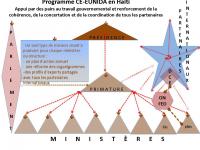
- reinforcement of the Cabinet of the presidency;
- better coordination of government work by the Prime Minister's office;
- changes in the rules for the parliament;
- innovations in Ministries such as Justice and Security and Social Affairs, independently of the changes in the ministerial team.
Donor Support
The European Commission supported the programme because it enacts the major propositions of the Paris Declaration on aid effectiveness. But it is also because the methods and human resources employed reflect some of the key tenets of the Reform of Technical Cooperation:
- Mostly using high level practitioners from member states, as envisaged in 2008 by the European Court of Auditors.
- By utilising institutional twinning, adapted to local context, this programme offers a concrete example to the management of EuropeAid, which has been asking for this sort of innovation.
Interest from elsewhere
Several ACP countries have expressed an interest in the approach. In particular, the Burundi Ambassador to Brussels expressed his government's intention to explore the various ways and means of doing an institutional audit, which would form the basis for engaging in a reform process. A EUNIDA mission is envisioned in Burundi, using a similar format to the Haiti mission.
Other donors such as Canada, have subsequently offered support to Haiti in a similar fashion to the EC/ EUNIDA programme model. The Haitian President's office and the Parliament have also requested similar support based on the results attained in the ministries.
An on-going process
The only regrets that the evaluation mission expressed were about the absence of follow-up of each of the initial interventions by ‘recall' missions, which could be put into the future programme. Such an ‘arms-length' support could permit continuity without creating a permanent presence, which would be against the spirit of the programme, that the national administration owns the process.
Price Pady, the former National Authorising Officer of the European Development Fund, said that coordination of the programme could have been better, but stressed that Haiti is at the beginning of a long journey.
"The road is long, and we must think in the long-term. I think that, with patience, we will get there in the end," said Mr Pady. "We're on the right note and we're ready to take all the corrective measures necessary to benefit from the contribution already made by the international community for the benefit of the people of Haiti."
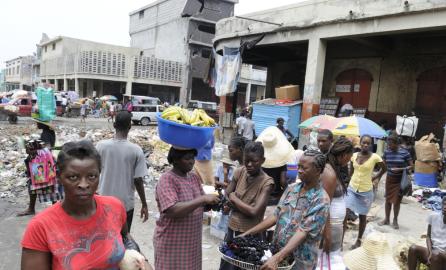
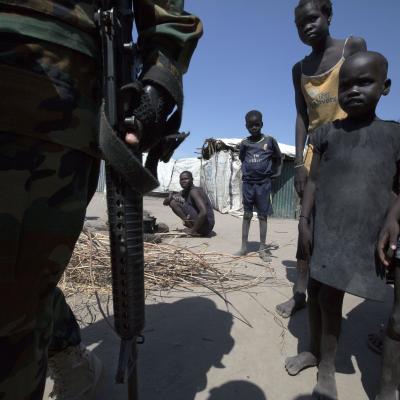


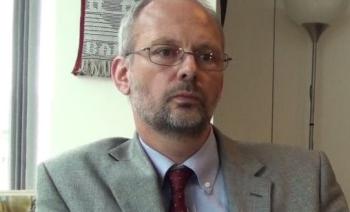
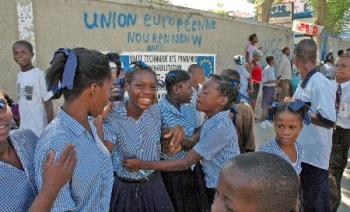
Log in with your EU Login account to post or comment on the platform.